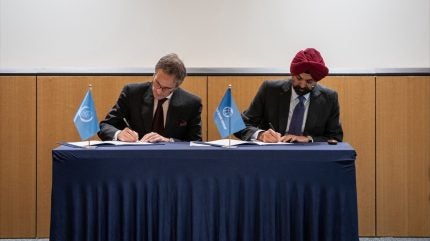
The World Bank Group has partnered with the International Atomic Energy Agency (IAEA) to support the safe and responsible use of nuclear power in developing nations.
The alliance aims to address growing electricity demands while ensuring environmental stewardship.

Discover B2B Marketing That Performs
Combine business intelligence and editorial excellence to reach engaged professionals across 36 leading media platforms.
World Bank Group president Ajay Banga and IAEA director-general Rafael Mariano Grossi formalised their partnership with a memorandum of understanding (MoU).
The partnership encompasses three primary objectives where IAEA will guide the World Bank Group.
These include enhancing knowledge about various aspects of nuclear technology; aiding countries in safely prolonging existing reactors’ operational life; and expediting small modular reactor development due to their adaptability and reduced initial investment requirements.
The collaboration underscores a novel approach by the World Bank towards electrification that balances accessibility, affordability, reliability and emissions management.

US Tariffs are shifting - will you react or anticipate?
Don’t let policy changes catch you off guard. Stay proactive with real-time data and expert analysis.
By GlobalDataWith projections indicating that electricity needs in developing countries will more than double by 2035, this initiative seeks to empower nations with suitable energy solutions aligned with their development goals and climate commitments.
Nuclear power offers continuous baseload generation capabilities, which are critical for economic sectors reliant on stable power supply, the IAEA noted.
Banga said: “Our partnership with the IAEA marks an important step, and I am grateful to Rafael for his personal commitment and leadership in making this possible. Together, we will deepen our expertise, support countries that choose nuclear, and ensure that safety, security and sustainability guide every step forward.”
Currently, 31 countries operate nuclear plants contributing around 9% to global electricity production, nearly one-quarter being low-carbon sources.
More than 30 additional nations are exploring or initiating nuclear programmes with IAEA assistance for secure, sustainable implementation.
Grossi said: “This landmark partnership, yet another sign of the world’s return to realism on nuclear power, opens the door for other multilateral development banks and private investors to consider nuclear as a viable tool for energy security and sustainable prosperity. Together, we can help more people build a better future.”
Earlier in June, the World Bank agreed to end its long-standing ban on funding nuclear energy initiatives in developing nations to address growing electricity demand.





